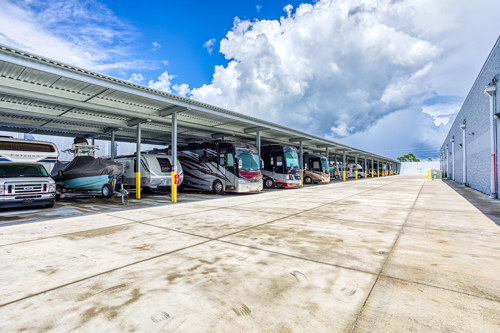Owning a boat lets you enjoy long summer days on the water, but once the season ends, it’s important to know how to protect your vessel. Choosing the right off-season storage option can save you money on repairs, extend the life of your boat and make spring de-winterization much easier. From indoor options like dry stack facilities and self-storage units to outdoor solutions such as covered slips and driveway storage, each choice comes with its own benefits and considerations. In this guide, we’ll walk through the most common storage options, along with practical steps you can take beforehand to keep your boat in top condition until it’s time to launch again.
1. Where to Store Your Boat: Indoor vs. Outdoor
Leaving your boat in the driveway while it’s not in use for short periods of time (such as in between weekends) is a fairly common practice, but long-term storage in the off-season requires a bit more research and planning.
In general, you have two general storage options as a boat owner: indoor or outdoor. Indoor facilities include dry stack storage, garage storage and enclosed self-storage units. Outdoor facilities include driveways, outdoor self-storage parking spots and marina slips.

2. Dry Stack Boat Storage
Dry stack storage is an out-of-water option where boats are stacked vertically inside a large, warehouse-style facility. Operators use forklifts or cranes to move the vessels, so you’ll typically need to call ahead to schedule retrieval, especially during peak boating months. Beyond protection from harsh weather, many dry stack facilities offer concierge-style services such as winterization, shrink-wrapping, detailing and even fueling. Security is usually top-notch, and some locations can accommodate larger boats, though availability and price vary.
Pros of dry stack storage:
- Protection from the elements, including sun, rain and snow
- Reduced theft risk thanks to stacked design and gated access
- Enhanced security with cameras, PIN/key entry and staff oversight
- Added convenience with optional services like maintenance or cleaning
- Space-efficient, often accommodating many boats in one location
Cons of dry stack storage:
- Limited accessibility — you’ll need to schedule pickups in advance
- Higher cost compared to outdoor storage options
- Size restrictions at some facilities (very large or wide boats may not fit)
- Potential wait times during peak boating season
- Less flexibility for last-minute outings compared to driveway or slip storage
3. Garage Boat Storage
If you have the space, keeping your boat in your home garage is one of the most budget-friendly storage options. It provides full protection from the elements while giving you direct, anytime access — perfect if you want to perform your own maintenance or simply keep an eye on your vessel throughout the off-season. Since the garage is on your property, you won’t need to pay monthly fees or schedule appointments to use your boat.
However, garages aren’t perfect for boat storage. Many standard garages aren’t designed to fit larger boats, and maneuvering your vessel in and out without scraping the sides or garage door frame can be tricky. It’s also worth considering that your garage likely doubles as storage for household items or your car, so space can quickly become tight.
Pros of garage boat storage:
- Saves money by avoiding rental fees at a storage facility
- Full protection from rain, snow and UV damage
- 24/7, direct access to your boat without scheduling a pickup
- Ideal for DIY winterization, cleaning or repairs at your convenience
- Extra security since the boat stays on your property
Cons of garage boat storage:
- Space limitations — standard garages may not fit larger boats or trailers
- Tight maneuvering can risk scratches or dings during parking
- Reduces available space for vehicles or other household storage
- May lack professional-grade ventilation or humidity control, increasing the risk of mold or mildew if not prepped properly
- Not an option for homeowners without a large enough garage or HOA restrictions
4. Marina Boat Storage
For many boat owners, renting a slip at a marina is the most convenient option. This is especially true if you plan to use your boat frequently in the same location. With your vessel already in the water, you avoid the hassle of trailering or hauling it back and forth. Most marinas also provide helpful amenities like electrical hookups, fueling stations, water access and (in some cases) on-site maintenance or security. Plus, the social atmosphere of a marina can be a draw, with other boaters nearby and easy access to waterfront restaurants or shops.
That said, keeping your boat in the water year-round comes with trade-offs. Marina storage is typically more expensive than land-based options, and long-term water exposure can increase wear and tear, including hull damage, algae growth and corrosion. Availability may also be limited at popular marinas, especially during peak boating season.
Pros of marina boat storage:
- Maximum convenience — your boat is already in the water
- 24/7 access for spontaneous outings
- Amenities such as electrical hookups, fueling stations and fresh water
- No need to purchase or haul a boat trailer
- Vibrant community setting with access to shops, restaurants, and other boaters
Cons of marina boat storage:
- Generally, more expensive than land storage options
- Constant water exposure increases the risk of hull damage, algae and corrosion
- Limited availability at high-demand marinas
- May require additional upkeep, such as frequent cleaning or anti-fouling treatments
- Higher insurance premiums in some cases, due to increased risk of damage
5. Driveway Boat Storage
Storing your boat in the driveway is one of the most straightforward and cost-effective options. It keeps your vessel close at hand without sacrificing garage space, and you’ll have immediate access whenever you want to tackle maintenance or prepare for the next boating season. For many homeowners, it’s the easiest way to balance affordability with convenience.
Before committing, though, it’s important to check local ordinances or HOA rules. Some neighborhoods restrict long-term driveway storage or require boats to be screened from view with fencing, landscaping or an enclosed structure. You’ll also need to take extra precautions against the elements, since your boat will be exposed to sun, rain and snow unless you invest in a durable cover or canopy.
Pros of driveway boat storage:
- No rental fees — the most budget-friendly option
- Keeps garage space free for vehicles or other storage
- 24/7 access to your boat right outside your door
- Convenient for DIY maintenance or quick inspections
- Easy to prepare for transport when the season starts
Cons of driveway boat storage:
- Full exposure to the weather without a proper cover or shelter
- Potential HOA or municipal restrictions on visible boat storage
- Increased risk of theft or vandalism compared to secured facilities
- Takes up valuable driveway space, limiting vehicle parking
- May reduce curb appeal or affect property value if visible from the street
6. Outdoor Parking Spot at a Self-Storage Facility
Many self-storage facilities offer designated outdoor parking spaces specifically for boats. These spots can be uncovered — essentially an open-air lot — or covered, providing partial protection from sun and precipitation. Both options free up space at home while still keeping your vessel easily accessible, and facilities often include added perks like gated access, surveillance cameras and onsite staff. Covered parking tends to cost more than uncovered, but the extra shelter can extend the life of your boat’s exterior and reduce wear on the cover.
Outdoor storage at a facility strikes a balance between affordability and security, but it isn’t without its drawbacks. Even with a high-quality boat cover, your vessel is still exposed to fluctuating temperatures, humidity and potential pests. Availability of covered spaces can also be limited, particularly in high-demand regions or peak seasons.
Pros of outdoor parking at a self-storage facility:
- More affordable than indoor storage or marina slips
- Covered options offer added protection from sun and rain
- Facilities usually include gated access, surveillance, and staff presence
- Frees up valuable space at home (garage or driveway)
- Convenient location near highways, marinas or waterways
- Can be used to park your car or other vehicle when your boat is in use
Cons of outdoor parking at a self-storage facility:
- Uncovered spots leave boats fully exposed to the elements
- Even covered spaces don’t provide full climate control
- Availability of covered parking may be limited and more expensive
- Requires a reliable boat cover or shrink-wrap for extra protection
- Still vulnerable to pests, dirt and weather-related wear over time
7. Indoor Storage Unit at a Self-Storage Facility
Indoor storage is one of the most secure and protective ways to keep your boat during the off-season. Depending on the facility, options range from oversized drive-up units — where you can tow your boat directly inside — to climate-controlled spaces that regulate temperature and humidity. Drive-up units make it easy to pull in, park, and lock up, while climate-controlled units offer the added benefit of protecting delicate materials like upholstery, electronics, and wood finishes from mold, mildew, and extreme weather.
This type of storage is ideal for owners of classic boats, high-value vessels or anyone who wants maximum peace of mind. That said, it’s also among the most expensive storage options, and not every facility offers units large enough to accommodate bigger boats or trailers.
Pros of indoor boat storage units:
- Full protection from weather, pests, and UV damage
- Enhanced security with gated access, locks, and surveillance
- Drive-up units allow for easy towing in and out
- Climate-controlled options safeguard delicate interiors and electronics
- Great for long-term storage or valuable boats that need extra care
Cons of indoor boat storage units:
- Typically the most expensive option compared to outdoor or dry storage
- Availability of oversized or climate-controlled units may be limited
- Requires towing the boat to the facility each time you want access
- Less convenient for last-minute outings compared to marina slips
- Not all facilities offer units large enough for very big boats









